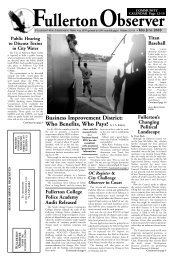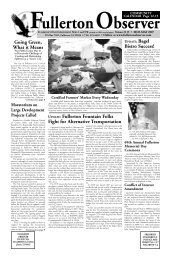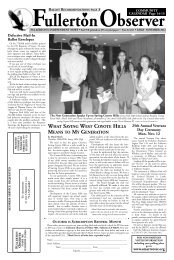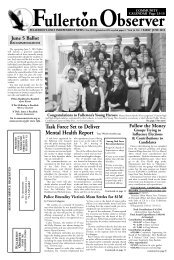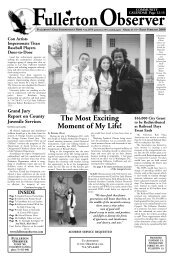Download - Fullerton Observer
Download - Fullerton Observer
Download - Fullerton Observer
You also want an ePaper? Increase the reach of your titles
YUMPU automatically turns print PDFs into web optimized ePapers that Google loves.
EARLY-MARCH 2009<br />
Continued from page 10<br />
Each homeless adult is assigned a professional<br />
case worker to help with job and<br />
other issues. The homeless can remain in<br />
the program for three to four months and<br />
they must get a job within 30 days.<br />
However, said FIES board president<br />
Jennings, the 30-day requirement can be<br />
extended “because the economy is so<br />
rough right now.”<br />
If the adults in the FIES program have<br />
no children, they can find shelter at participating<br />
churches that provide dinner,<br />
breakfast and a place for the homeless to<br />
sleep inside their buildings for two to<br />
three weeks.<br />
After that, the homeless adults in the<br />
FIES program move to another church<br />
that provides the same services. In<br />
<strong>Fullerton</strong>, the churches are First<br />
Christian, St. Paul’s Lutheran,<br />
Orangethorpe Methodist and First<br />
Presbyterian. St. Angela Merici Roman<br />
Catholic church, just across the border in<br />
Brea, and St. Paul’s Episcopal in Tustin<br />
and First Presbyterian in Garden Grove<br />
also are part of the program. Other<br />
churches and organizations often prepare<br />
meals and help out with the shelter program,<br />
organizers said.<br />
Temple Beth Tikvah housed the homeless<br />
as well until last year and members<br />
still are actively involved in helping FIES<br />
and those in need. One special role the<br />
Temple took on was providing shelter<br />
specifically over Christmas to give the<br />
Christian denominations a break during<br />
the time of celebration.<br />
Volunteers at the temple brought in a<br />
potted Christmas tree that the homeless<br />
decorated and held a small party. The tree<br />
later was planted on the temple’s grounds<br />
where it still grows, said Miriam Van<br />
Raalte, the temple’s administrator and<br />
education director. Their volunteers regularly<br />
take food to the shelter churches and<br />
work at the armory, continuing the tradition<br />
of taking the Christmas shifts so that<br />
Christian volunteers can go to church and<br />
be with family members.<br />
“The temple always steps up to the<br />
plate,” said Jennings. Thus the name,<br />
“<strong>Fullerton</strong> Interfaith.”<br />
The interfaith spirit of cooperation and<br />
support is what holds FIES together, said<br />
a number of volunteers. And although the<br />
organization is faith-based, “we do not<br />
evangelize,” said Bambas.<br />
For homeless families with children,<br />
FIES works with government agencies to<br />
assign motel vouchers or house up to 12<br />
families at a time (roughly 48 to 50 people)<br />
at the New Vista Transitional Living<br />
Center, where caseworkers help families<br />
get back on their feet.<br />
And when money is available, said<br />
Jennings, FIES offers help with rent and<br />
utility payments. In the long run, she<br />
said, it is less expensive to keep a family in<br />
its home and help the adults find jobs,<br />
than to let them become homeless,<br />
bounce children in and out of schools,<br />
and force them to start all over.<br />
All of this costs money and the support<br />
agencies are seeing donations flatten in<br />
the same way the economy is causing<br />
individuals to cut back.<br />
The religious groups continue to support<br />
FIES, along with some government<br />
grants, donations from PTAs, staff at the<br />
<strong>Fullerton</strong> School District and many other<br />
organizations.<br />
The Phelps Foundation has offered a<br />
$15,000 challenge grant and FIES has a<br />
year to match it.<br />
The Armory<br />
The National Guard Armory can house<br />
350 and is open from Dec. 5 through at<br />
least mid-April, said Lawrence G. Haynes<br />
Jr., executive director of Mercy House,<br />
which runs the shelter under a contract<br />
with the county.<br />
The county began opening the Armory<br />
to the homeless during bad weather about<br />
20 years ago, but this is the first year<br />
Mercy House has held the contract.<br />
All homeless can come in, get a hot<br />
meal, sleep on a cot and have a continental-type<br />
breakfast. “This is open to people<br />
who are living on the streets,” said<br />
Haynes.<br />
Ongoing volunteers helping out with<br />
the program include members of the<br />
Unitarian Universalist Church in<br />
<strong>Fullerton</strong>.<br />
Hot Meals<br />
Monday through Saturday, the homeless<br />
and others in need can find a hot<br />
meal at one of six <strong>Fullerton</strong>-area churches.<br />
Business is booming at Orangethorpe<br />
Christian Church where Debbie<br />
Campbell, co-director of the Hot Meals<br />
Program estimates the 16-year-old weekly<br />
dinner program now draws an average of<br />
200, many of them elderly or low-income<br />
residents of nearby apartments.<br />
The numbers are up from the 150 a<br />
year ago who came on Monday nights for<br />
turkey pot pie one week, sloppy Joes<br />
another or maybe enchilada casserole.<br />
Along with the main course there’s a vegetable,<br />
salad, bread and butter and<br />
dessert.<br />
Four generations of Campbells serve<br />
those in need, Debbie’s mother Edna<br />
Skeen, who’s lived in <strong>Fullerton</strong> 56 years,<br />
Debbie’s daughter Christina Campbell,<br />
the co-director of the Hot Meals program<br />
and Debbie’s granddaughter, 7th grader<br />
Adena Bentley.<br />
The congregation at Orangethorpe<br />
puts on the dinner one week during the<br />
month and the other weeks are sponsored<br />
by other churches in the area: Yorba<br />
Linda Presbyterian, Anaheim Freeform,<br />
Orangethorpe United Methodist and the<br />
Korean congregation at Orangethorpe<br />
Christian.<br />
Albertson’s and Trader Joe’s frequently<br />
donate food and Panera on Sunnycrest<br />
sends bread. Supplies also come from<br />
Orangethorpe’s sister church, First<br />
Christian, which offers its weekly hot<br />
meal on Wednesday nights.<br />
The hot meal program isn’t a part of<br />
FIES, but the churches that host the dinners<br />
generally are members.<br />
One of the oldest weekly hot meal programs<br />
began in 1988 when 15-year-old<br />
Brian Coleman and other members of the<br />
Youth Group at St. Andrew’s Episcopal<br />
Church were studying homelessness and<br />
poverty in the third world.<br />
After the class, they headed across the<br />
street toward the Carl’s Jr’s. But, said<br />
Coleman, now an Episcopal priest in<br />
Battle Creek, Michigan, as they crossed<br />
the church parking lot, he noticed “in the<br />
doorway of the church hall there was a<br />
homeless man curled up in a ball, sleeping.”<br />
Coleman bought the man a hamburger.<br />
“It got us to thinking. There are people<br />
right here who need help.”<br />
So Coleman and classmate Cindy<br />
Freeland organized a hot meal for the<br />
homeless program at St. Andrew’s.<br />
Today, it serves about 130 people each<br />
Friday night, according to volunteer<br />
director John Mignot. Albertson’s and<br />
Henry’s provide the bread and desserts<br />
and the church and its members donate<br />
the food. “<strong>Fullerton</strong> is a caring community<br />
because if you need to, you can eat<br />
every day,” he said.<br />
Volunteers for that hot meal program<br />
also come from Morningside Presbyterian<br />
Church. Members of First Presbyterian<br />
Church make up sack lunches—two<br />
sandwiches and fruit—for the homeless<br />
and others to take with them to make<br />
sure they have something to eat later on.<br />
by Anthony Columbo<br />
Homelessness could be remedied if<br />
society increased its togetherness and<br />
improved its methods of offering support.<br />
The homeless are fragile not only<br />
because of their inability to defend themselves,<br />
but also because they are so easily<br />
dismissed by society. For the month of<br />
January I have volunteered with the<br />
Mercy House working at the Army<br />
National Guard Armory, 400 S.<br />
Brookhurst in <strong>Fullerton</strong>, and my job was<br />
to fold blankets that the homeless slept<br />
on during the night.<br />
The first morning, I left my house at<br />
4:22am. For breakfast, I had a piece of<br />
zucchini pound cake. I arrived at the<br />
dark Armory and it was already swarming<br />
with homeless people entering, leaving,<br />
smoking cigarettes, and just sitting<br />
around. A JFK transportation bus<br />
arrived and some loaded in. I was greeted<br />
by two security guards; one was busy<br />
speaking Spanish to a lady in a wheel<br />
chair. The Armory consisted of an empty<br />
grey cement floor, and a roomful of people<br />
sleeping, getting dressed, or packing<br />
their belongings for their departure.<br />
I was immediately introduced to Gino,<br />
a skinny young man who wore a green<br />
beanie, and Albert, a middle aged, tall<br />
man with a thin mustache. They are<br />
both paid employees that supervise the<br />
Armory for the winter months.<br />
Albert directed me to a task of folding<br />
the sleeping blankets so the laundry service<br />
could retrieve the blankets, wash<br />
them, and return them for the next<br />
morning. Gino and I folded a total of<br />
140 blankets, stuffed them in duffle bags<br />
with ten to a bag. The bags would be<br />
counted and picked up by the laundry<br />
service. We had 14 duffle bags, and one<br />
trash bag full of towels. Albert noted<br />
that 141 people had slept in the Armory<br />
that night, and one blanket had gone<br />
missing. As I was folding the cotton<br />
blankets, I noticed that some of the blankets<br />
were still warm.<br />
After I finished the folding task I took<br />
a broom and swept the cigarette butts<br />
and trash outside. I begun sweeping cigarettes<br />
when I heard an older woman’s<br />
voice, “Are you American?”<br />
I turned. There was a small lady no<br />
more than 5’3”, with a huge birth mark<br />
on her face.<br />
“Yes, what are you?” I replied.<br />
“Chinese. Do you know when the<br />
bus is coming? Does the Armory give<br />
out bus passes?” She asked.<br />
“I don’t know, let me find out.” I<br />
turned and went back inside the Armory.<br />
I found the security guard and he told<br />
me that two buses come, one at 5:15am,<br />
and the other at 5:30am. The current<br />
time was 5:41am.<br />
I returned to the lady, “The second bus<br />
already left, I’m sorry.”<br />
“Do you know where I could buy a bus<br />
pass?” She inquired.<br />
“Yes, 7-11 sells them, Ralphs sells<br />
them, and I think you could buy them<br />
from the bus driver if you have two<br />
bucks.”<br />
She was staring at me blankly. I felt as<br />
if I was shouting into an empty cave, but<br />
not hearing an echo. Was she understanding<br />
me? I wasn’t sure.<br />
She then explained her story to me.<br />
Her parents were immigrants who died<br />
and left her without a place to go. She’s<br />
had a few jobs here and there, rented a<br />
place in <strong>Fullerton</strong>, but as of recent times<br />
she is left without a job, and no home.<br />
She talked a lot about money. One<br />
thing she distinctly said was, “See when I<br />
was paying rent, time would go so fast,<br />
but now, time goes too slow. Tonight,”<br />
<strong>Fullerton</strong> <strong>Observer</strong> Page 11<br />
What It’s Like to Be Homeless<br />
she shook her head, “tonight felt like<br />
eight days.”<br />
I just stood and listened to the lady.<br />
Albert sent me home at 6:36am. When<br />
I returned home, I fell asleep before I<br />
could wash my hands.<br />
The second morning I arrived at the<br />
mercy house a little late, around 5:21 am,<br />
and looked for Albert. He was already in<br />
a busy rush trying to organize the cleaning<br />
of the coffee area, the folding of the<br />
blankets, and the organization of the<br />
sleeping mats. I was assigned to load the<br />
sleeping mats on a pull cart, and stack<br />
them in a cargo bin outside, which was<br />
locked each night. Chris, my spotter,<br />
helped me lift the mats and move them<br />
into the cargo bin.<br />
I asked the manager Albert, “how<br />
many people did you have spend the<br />
night last night?” He said, “151”. “About<br />
what were their age?” I questioned.<br />
“Most of them were between 22 and 35,”<br />
he paused, “we had some close to seventy,<br />
and another that was a junior in High<br />
school.”<br />
What causes homelessness? I think the<br />
Chinese woman was indirectly telling me<br />
the answer. In fact, I think she had a<br />
death in the family (both her parents),<br />
and struggled finding a decent job that<br />
provided for her needs. She was an immigrant<br />
that spoke English with a thick<br />
Chinese accent. She mentioned money,<br />
“if I had money, I could pay rent...” and<br />
also she mentioned, “and traveling all the<br />
time, it is tiring.” Homelessness is<br />
change of circumstance that takes its<br />
affect on a person down on their luck.<br />
People think homelessness only effects<br />
people who are struggling with no means<br />
of assistance; some lack proper identification,<br />
social security cards, or driver’s<br />
licenses, but statistics from the OC<br />
Health Care Agency show that a majority<br />
of the homeless work full time but<br />
cannot afford to pay rent on what they<br />
are paid. Others have been laid off and<br />
with unemployment rising past 7.2 percent<br />
perhaps the task of “getting a job” is<br />
much more difficult than imagined.<br />
The promises of America are to stand<br />
for justice, equality, and holding close the<br />
“tired, weak and weary.” But, sadly, there<br />
is even a debate as to whether helping the<br />
homeless is a right thing to do; the common<br />
perception against not providing<br />
alms to the poor is either because they are<br />
substance abusers, or they need to<br />
empower themselves in order to “stand<br />
on their own two feet” and “get a job”.<br />
In the month of January, a total of<br />
3,842 homeless people stayed at the<br />
Armory. The overall age group of the<br />
people staying the night ranged from 18<br />
to 60 years old with the median group<br />
age between 30 and 40 years old. This<br />
does not include children who stayed<br />
with their parent or parents. We can<br />
change that if each of us does our part.<br />
If You Want to Help<br />
the Homeless or Know<br />
of Someone Who Needs<br />
Help, Contact:<br />
• www.mercyhouse.net or contact<br />
volunteer coordinator Ashleigh<br />
Camba at 714-836-7188<br />
•www.fies.us or call 714-871-3032<br />
• www.211oc.org or dial 2-1-1<br />
or (888) 600-4357<br />
• www.officeonaging.ocgov.com<br />
(714) 567-7418<br />
•www.ocpartnership.net<br />
(714) 288-4007



